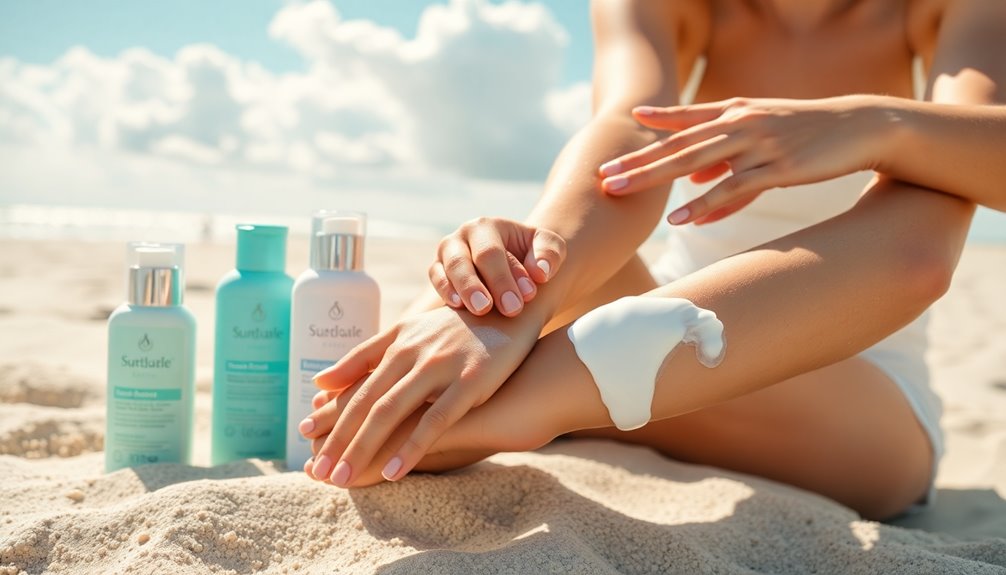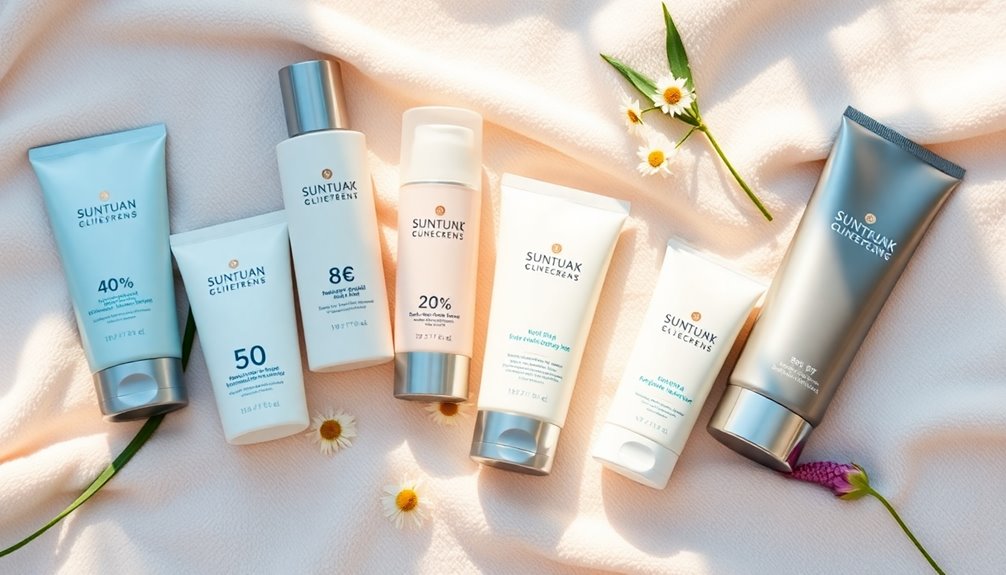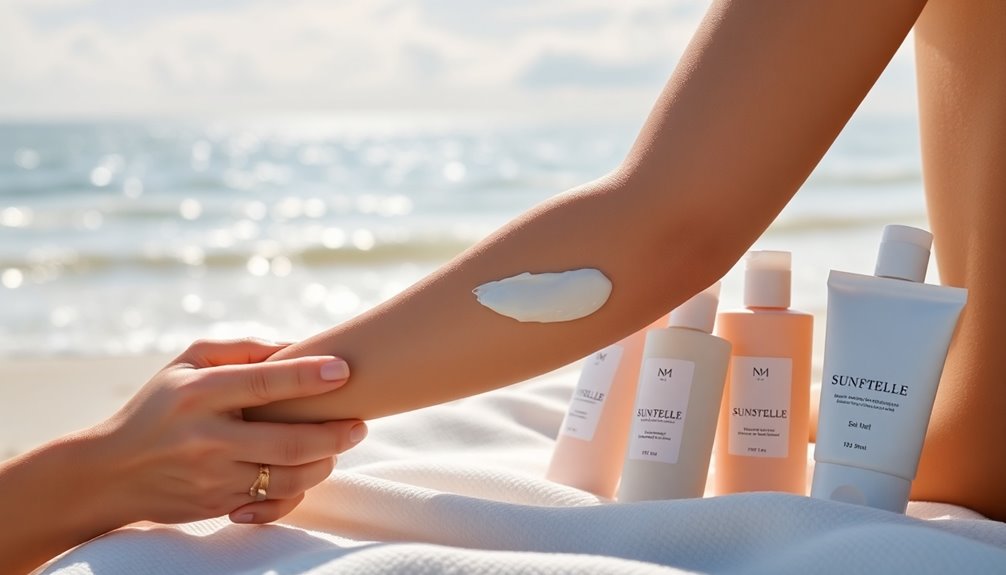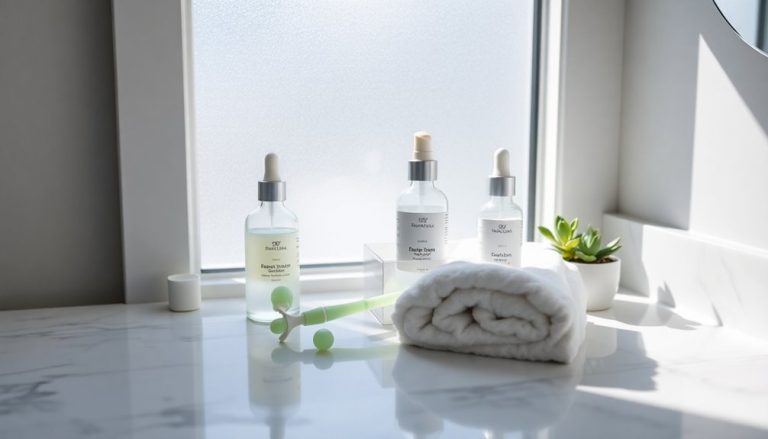When you're choosing a sunscreen for sensitive skin, prioritize mineral-based options like zinc oxide and titanium dioxide. Look for soothing ingredients like aloe vera and chamomile, and avoid fragrances, alcohol, and chemical filters that can irritate your skin. Brands like EltaMD UV Clear and La Roche-Posay Anthelios offer great formulations. Apply generously, about an ounce for body coverage, and reapply every two hours. Also, remember to patch-test new products. Following these guidelines will help you find the best sunscreen for your needs, and there's more to discover about how to keep your skin protected.
Key Takeaways
- Choose mineral-based sunscreens with zinc oxide or titanium dioxide for gentle, broad-spectrum protection suitable for sensitive skin.
- Look for soothing agents like aloe vera and antioxidants such as vitamin E to calm irritated skin.
- Avoid sunscreens with fragrances, alcohol, and chemical UV filters to prevent potential allergic reactions.
- Apply a generous amount of sunscreen 15-30 minutes before sun exposure and reapply every two hours.
- Consider recommended options like EltaMD UV Clear or La Roche-Posay Anthelios, designed specifically for sensitive skin.
Understanding Sensitive Skin

Understanding sensitive skin requires recognizing its unique characteristics and triggers. You might notice that your skin reacts more intensely to products or environmental factors than others. This heightened sensitivity often manifests as redness, itching, or burning sensations. Using products like waterproof mascara can help maintain a polished look without aggravating your skin.
It's crucial to pay attention to these signs since they can indicate your skin's intolerance to certain ingredients or conditions.
Common triggers for sensitive skin include harsh chemicals, fragrances, extreme temperatures, and even stress. If you've experienced reactions in the past, you may want to keep a journal of your skincare products and any changes in your environment. This record can help you pinpoint what exacerbates your sensitivity.
Moreover, your skin barrier plays a significant role in how your skin responds to various stimuli. A compromised barrier can make your skin more vulnerable to irritants and allergens.
You should also consider factors like genetics and existing skin conditions, as they can contribute to sensitivity. Additionally, using products with sunscreen sticks can provide a gentler application method for those with sensitive skin.
Key Ingredients to Look For
When choosing a sunscreen for sensitive skin, look for formulas that boast gentle and effective ingredients. First, consider mineral-based sunscreens containing zinc oxide or titanium dioxide. These ingredients provide broad-spectrum protection and sit on top of your skin, reflecting UV rays rather than absorbing them, which reduces the chance of irritation.
Next, pay attention to soothing agents like aloe vera, chamomile, or calendula. These natural extracts help calm inflammation and redness, making your skin feel more comfortable throughout the day.
Additionally, opt for sunscreens free from fragrances, alcohol, and parabens, as these can exacerbate sensitivity and lead to breakouts.
You might also want to look for antioxidants like vitamin E or green tea extract. These ingredients help protect your skin from free radicals and environmental stressors, providing added defense against sun damage. Incorporating a Vitamin C serum into your skincare routine can further enhance your skin's protection and revitalization.
Lastly, consider formulas labeled as hypoallergenic or non-comedogenic. These products are specially formulated to minimize the risk of allergic reactions and won't clog your pores, ensuring your skin stays healthy and irritation-free.
Best Sunscreens for Sensitive Skin

Finding the best sunscreens for sensitive skin can feel overwhelming, but it doesn't have to be. Start by looking for mineral-based options that feature zinc oxide or titanium dioxide. These ingredients provide effective UV protection without irritating your skin. Additionally, incorporating a high-quality night cream into your skincare routine can help maintain your skin's hydration overnight.
One standout option is EltaMD UV Clear Broad-Spectrum SPF 46. This lightweight formula not only shields your skin from harmful rays but also contains niacinamide, which helps soothe inflammation.
Another excellent choice is La Roche-Posay Anthelios Mineral SPF 50. It's fragrance-free and specifically designed for sensitive skin, offering broad-spectrum protection while keeping your skin hydrated.
If you prefer a tinted sunscreen, try Colorescience Sunforgettable Total Protection Brush-On Shield SPF 50. This mineral powder is easy to apply and perfect for on-the-go touch-ups.
For those who want a more budget-friendly option, consider Neutrogena Sensitive Skin Sunscreen SPF 60. This formula is free from dyes and fragrances, making it a safe choice for even the most reactive skin types.
Remember to always patch-test new products to ensure they suit your skin. Additionally, using a high-quality anti-aging cream can further enhance your skin's overall appearance and protect it from premature aging. With these recommendations, you'll be well on your way to finding the right sunscreen for your sensitive skin.
Application Tips for Effectiveness
Choosing the right sunscreen for sensitive skin is just the first step; how you apply it's equally important for maximum protection. Start by applying sunscreen about 15-30 minutes before you head outdoors. This gives it time to absorb and form a protective barrier.
Use a generous amount—about a shot glass full for your entire body and a nickel-sized dollop for your face. When applying, use gentle, circular motions to spread the product evenly. Don't forget common areas often overlooked, like your ears, neck, and the tops of your feet.
If you're using a spray sunscreen, ensure it's applied in a thick layer and rub it in to avoid any missed spots. Reapply every two hours, or more often if you're swimming or sweating.
Even if your sunscreen is labeled as water-resistant, it's good practice to reapply afterward, as no sunscreen is completely waterproof. Lastly, consider wearing protective clothing and seeking shade whenever possible to enhance your defense against harmful UV rays.
Common Mistakes to Avoid

Even the best sunscreen won't protect your sensitive skin if you're making common mistakes during application. One major error isn't applying enough product. Many people underestimate the amount needed; you should use about a shot glass worth for your entire body. Skimping on the application leaves areas unprotected and increases your risk of sunburn.
Another mistake is forgetting to reapply regularly. Sunscreen wears off, especially after swimming or sweating. You should reapply every two hours, or more often if you're in the water.
Also, don't wait until you're outside to apply; put it on 15-30 minutes before sun exposure for maximum effectiveness.
Many also overlook areas like the ears, back of the neck, and the tops of your feet. These spots are just as vulnerable to UV rays and shouldn't be neglected.
Lastly, be cautious with expired products. Sunscreens can lose effectiveness over time, so always check the expiration date.
Recommended Sunscreen Brands
When it comes to protecting sensitive skin, several sunscreen brands stand out for their gentle formulas and effective sun protection. Choosing the right product can make a significant difference in how your skin reacts to sun exposure.
Here are some recommended brands that prioritize your skin's health while keeping you shielded from harmful UV rays:
- Neutrogena Sheer Zinc: This mineral-based sunscreen provides broad-spectrum protection and is known for its lightweight feel, making it ideal for daily use.
- La Roche-Posay Anthelios: With its advanced formula, this brand offers strong protection and is often recommended by dermatologists for sensitive skin types.
- Blue Lizard Sensitive: This sunscreen is free from harsh chemicals and fragrances, making it perfect for those prone to irritation. Plus, it changes color to remind you to reapply!
- Aveeno Positively Mineral: Formulated with natural ingredients, this sunscreen blends well and hydrates your skin, providing a soothing effect while protecting against the sun.
Frequently Asked Questions
Can I Use Sunscreen on My Face and Body Interchangeably?
You can use sunscreen on both your face and body, but it's best to choose formulas designed for each area. Facial sunscreens often have added skincare benefits, while body sunscreens tend to be more robust.
How Often Should I Reapply Sunscreen on Sensitive Skin?
Did you know that 80% of sun damage occurs even on cloudy days? You should reapply sunscreen every two hours, or more often if you're sweating or swimming, to keep your sensitive skin protected effectively.
Are Mineral Sunscreens Better Than Chemical Ones for Sensitive Skin?
Mineral sunscreens often work better for your sensitive skin because they sit on top, providing a physical barrier against UV rays. They're less likely to irritate, making them a safer choice for you.
Can Sunscreen Expire or Lose Effectiveness Over Time?
Yes, sunscreen can expire and lose effectiveness over time. Check the expiration date on the bottle, and if it's past that date, it's best to replace it to ensure proper sun protection.
What Should I Do if I Experience a Reaction to Sunscreen?
If your skin's throwing a temper tantrum after using sunscreen, wash it off gently. Apply a soothing lotion or aloe vera to calm the irritation, and consider consulting a dermatologist for further guidance on your sensitive skin.
Conclusion
In the world of skincare, you really can't underestimate the importance of sun protection, especially if you have sensitive skin. Remember, "an ounce of prevention is worth a pound of cure." By choosing the right sunscreen and applying it correctly, you'll keep your skin healthy and protected from harmful UV rays. So, take the time to understand your skin's needs and avoid common pitfalls. Your skin will thank you for it!




